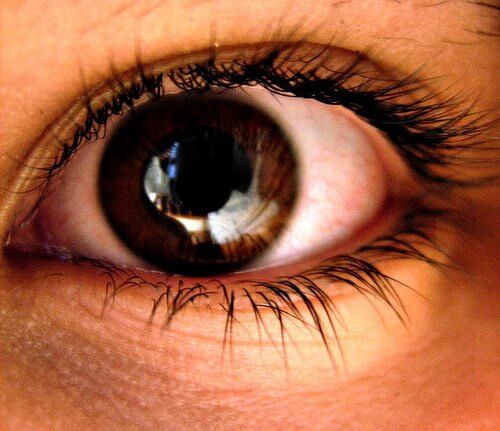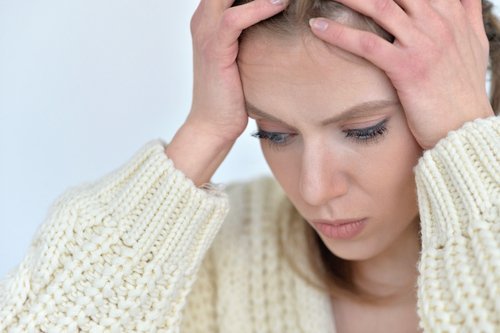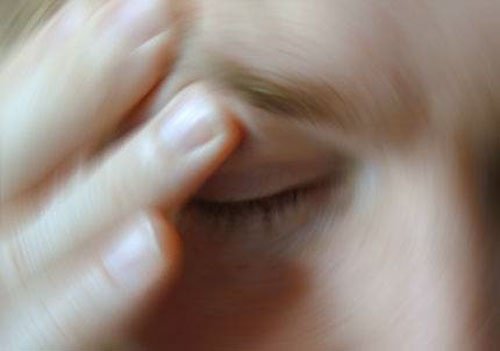Six Little-Known Effects of Anxiety on Your Body


Written and verified by psychologist Valeria Sabater
Besides headaches, body tremors, and sweaty hands, would you know what the unknown effects of anxiety are? Those that, although not so easy to notice with the naked eye, manifest themselves and cause discomfort.
Below we’ll reveal what they are and other interesting facts that’ll help you better understand the importance of seeking professional help and take the first step to learn how to better manage your emotions.
Little-known effects of anxiety on your body
Anxiety can have various effects on the body. Some are easier to notice at first glance than others, but all are undoubtedly just as harmful to the person experiencing them.
1. Dilated pupils

Having dilated pupils could imply, among other things, that you are in a state of alert. Therefore, it’s included within the unknown effects of anxiety.
We mean pupil dilation that isn’t related to a reaction to low light. If you’re suffering from severe anxiety, it’s a symptom of an underlying problem that needs to be understood and treated.
When your anxiety levels are high, it’s common to experience this unusual symptom that can trigger anything from dizziness to seeing strange lights around you to reduced vision.
It’s necessary to understand that the purpose of anxiety is to protect us against a risk or threat. Therefore, one of the physiological reactions of the vegetative nervous system is the pupil dilation. This phenomenon presents a very concrete end: to be able to have a clearer and more extensive vision of what surrounds us in order to flee.
Likewise, within the Hamilton Anxiety Scale (1959), oriented to measure the degree of this condition in patients, one of the 15 indicators is dilated pupils.
Learn about What Your Eye Color May Say About Your Health
2. Trouble swallowing
Trouble swallowing while eating or drinking is another very common symptom. This condition is known as Globus hystericus or “lump in the throat.”
Aguirre Álvarez, Martínez Lemus, and Núñez Orozco (2005) carried out a study where this condition is detailed and included within the somatotrophic disorders.
- This symptom is called dysphagia and is a clear sign of anxiety. It is related to your saliva-producing glands.
Therefore, your body’s primary goal is to retain fluids in order to support your muscles, because your muscles are what will help you run away.
3. Headaches are one of the effects of anxiety on your body

Anxiety makes all of the veins and arteries in your body contract for a very specific reason: to get more blood to your muscles.
Your circulation, then, becomes stronger and this encourages vasoconstriction, which leads to the classic headache. This kind of headache is most common in the first few hours of the day and in the afternoon.
Therefore, another of the unknown effects of anxiety is an intense headache, which makes it difficult to perform various activities and even to concentrate.
Read about When Should We Start Worrying About Headaches?
4. Jaw pain is one of the effects of anxiety on your body
Anxiety and stress tend to settle more in certain parts of your body than in others. We’re talking, of course, about your neck, shoulders, back, and jaw.
If you notice jaw pain that is worse in the morning and goes all the way to your ears, you probably have stress-induced bruxism. In other words, you’re grinding your teeth at night due to stress and anxiety.
You should see your doctor because while a mouthguard can help, it’s best to work out the root causes of your anxiety are so you can manage it properly.
5. Going to the bathroom more than usual
One of the little-known effects of anxiety has to do with the number of times we can go to the bathroom in a short period of time.
It happens to all of us at some point: you get to a situation that causes anxiety, like a test or job interview, and you have to go to the bathroom several times.
- It’s common, but it’s also one of the most interesting effects of anxiety on your body. That’s because when you’re anxious, your kidneys actually produce less urine. Why? For the reason, we just mentioned: your body is trying to retain fluids for your muscles.
- But in order to shed unnecessary weight so you can flee more quickly, your brain tells your body to go to the bathroom in order to eliminate urine, which makes us go so many times.
6. A surreal feeling: the sense that everything around you isn’t real or you aren’t a part of what you see

It may seem strange, but if you have gone through a moment of intense anxiety or stress you’ll know what we’re talking about. It’s when you suddenly feel the sensation that everything around you isn’t real. It’s like seeing the world from the outside and not feeling like you’re in it.
Where does this come from? Well, first of all, if this happens to you often you should tell your doctor.
- Intense anxiety affects your lungs.
- You breathe rapidly, and when too much oxygen builds up, you usually experience two things: the first is hyperventilation, and the second may be this surreal feeling.
- Your brain isn’t properly processing the situation and causes the sensation.
What should you do if you constantly have anxiety?
When you have constant anxiety, it’s necessary to look for solutions. To do this, talk to someone you trust and ask for help. In this way, you can begin to learn how to better manage your emotions and thoughts, and most importantly: learn how to make the most of life, despite problems that may arise.
Remember that, in addition to having a psychological impact, anxiety can also have a negative impact on physical health in various aspects of which we aren’t always aware of. For this reason, it’s worthwhile to find a solution to it and therefore recover our well-being.
All cited sources were thoroughly reviewed by our team to ensure their quality, reliability, currency, and validity. The bibliography of this article was considered reliable and of academic or scientific accuracy.
- Gray, J. A. (1985). The neuropsychology of anxiety. Issues in Mental Health Nursing, 7(1–4), 201–228. https://doi.org/10.3109/01612848509009455
- Keil V, Hepach R, Vierrath S, Caffier D, Tuschen-Caffier B, Klein C, et al. Children with social anxiety disorder show blunted pupillary reactivity and altered eye contact processing in response to emotional faces: Insights from pupillometry and eye movements. J Anxiety Disord. 2018;
- Martínez Lemus H, Núñez Orozco L. Manifestaciones pseudoneurológicas de los trastornos somatomorfos. Rev Mex Neurocienc. 2005;
- Lai HH, Rawal A, Shen B, Vetter J. The Relationship Between Anxiety and Overactive Bladder or Urinary Incontinence Symptoms in the Clinical Population. Urology. 2016;98:50–57. doi:10.1016/j.urology.2016.07.013
This text is provided for informational purposes only and does not replace consultation with a professional. If in doubt, consult your specialist.








